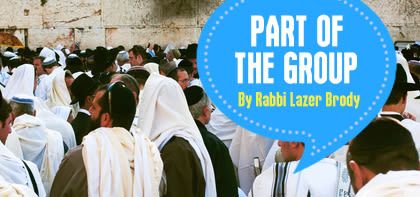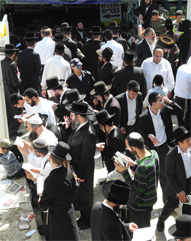
Tzav: Part of the Group
Words cannot describe the importance of learning and praying with the public, for King Solomon said, "A multitude of people is a king's glory"...

"This is the law of the burnt offering…" (Leviticus 6:2).
The "Ben Ish Chai" of saintly and blessed memory teaches us an important lesson[1], namely, that a person should both pray and learn Torah in a group and with a quorum of ten men. The reason is that one's individual prayer or Torah learning doesn't always have the power to ascend as far as the Heavenly Throne, because it's blemished with a lack of intent or motivated by personal gain. But, when a person learns and prays with the public, his individual prayers and learning don't undergo fine-tooth-comb inspections; they ascend with the prayers and Torah learning of the entire prayer or learning quorum. Especially, if there is one righteous individual in the group whose prayers and Torah learning have pure intent and are totally for Hashem's sake, then his efforts elevate the praying and learning of the entire group. As such, it's always a good idea to pray and learn in a group, and with upright, pious individuals as well.
The above notwithstanding, the Ben Ish Chai adds that there is a difference between the prayers and Torah learning that ascend on their own merits, and those that ascend by virtue of the group. We can understand this concept better with the following allegory:
The king wanted to honor one of his victorious generals who bravely overcame a vicious enemy that threatened the kingdom. The King invited the general to dine with him at the royal table. The general arrived at the palace with his aide and his driver. By virtue of the general, the aide and the driver entered  the palace, something that they could not possibly have done on their own merit. No one in the palace guard or the royal staff would dream of denying the two entrance, but they certainly wouldn't be seated at the king's royal table. The aide and the driver were given a lovely dinner too, but they ate at the table with the king's butler and valet. After the meal, they waited patiently in a side room until the king and the general finished dining. Sure, the aide and the driver ate at the palace, but one can't compare the butler's table to the king's table…
the palace, something that they could not possibly have done on their own merit. No one in the palace guard or the royal staff would dream of denying the two entrance, but they certainly wouldn't be seated at the king's royal table. The aide and the driver were given a lovely dinner too, but they ate at the table with the king's butler and valet. After the meal, they waited patiently in a side room until the king and the general finished dining. Sure, the aide and the driver ate at the palace, but one can't compare the butler's table to the king's table…
The king in our allegory represents Hashem. The heroic general is the one who prays and learns with intent, for Hashem's sake and not for his own self-aggrandizement. Understandably, he enters the palace on his own merits. But, those whose prayers and Torah learning are blemished can still reach the "palace" – the Heavenly Throne – thanks to their connection with the pious individual who prays and learns with intent, just like the aide and the driver in our allegory who enter the palace with the general. They wouldn't be able to gain entrance on their own.
Words cannot describe the importance of learning and praying with the public, for King Solomon said, "A multitude of people is a king's glory"[2]. The greater the prayer or learning gathering, the greater does the sanctification of Hashem's Name become. Since every individual – no matter what his individual merits are – is an integral part of the multitude; as such, he attains an equal reward, for his participation increased the magnitude of the Kiddush Hashem, the sanctification of Hashem's Name. Clearly, a person praying at home alone misses important opportunities to sanctify Hashem's Holy Name, because one may only say Kaddish, Kedusha and Borchu in a prayer quorum.
Apparently, the words of the Ben Ish Chai and King Solomon contradict one another, but not so: when a person makes a dedicated effort to attend public Torah lessons and to pray in public, his dedication invokes a measure-for-measure reward: he made special efforts to frequent Hashem's houses of prayer and houses of learning in this world, so he will be rewarded in like manner in the World to Come, being able to enter the King's palace together with the great tzaddikim. This is not something to take lightly. Our own efforts to serve Hashem with the public, to pray and learn in a minyan wherever possible, propels our learning and prayers right up to the Heavenly throne, just like the burnt offering, the korban olah, which is exclusively for Hashem and totally burned on the altar.







Tell us what you think!
Thank you for your comment!
It will be published after approval by the Editor.